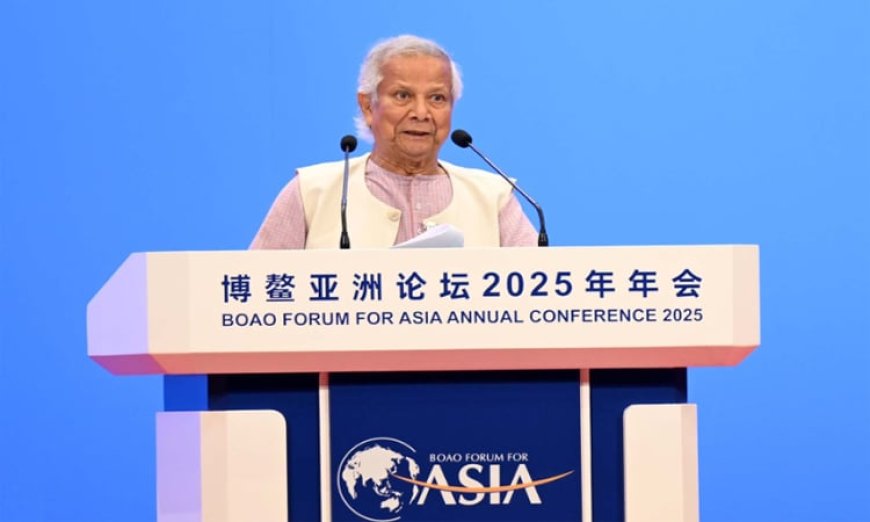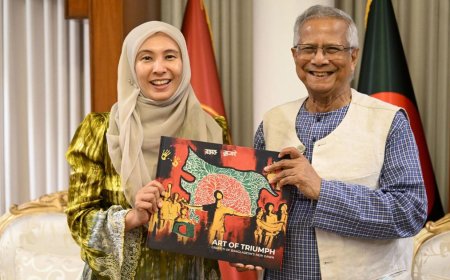Bangladesh implements key reforms to rebuild public trust, says CA at BFA meeting
The Chief Adviser stated, "While shaping a new Bangladesh, we encounter various challenges similar to those faced by other Asian nations."

Bangladesh Implements Key Reforms to Restore Public Trust, Says Chief Adviser
Chief Adviser Professor Muhammad Yunus stated that his interim government has undertaken crucial reforms to rebuild public confidence in Bangladesh.
"Our youth and citizens have shown remarkable resilience and determination in shaping the future of Bangladesh. To regain public trust, we have initiated essential reforms," he said while addressing the opening plenary of the Boao Forum for Asia (BFA) conference today.
Professor Yunus highlighted the establishment of independent commissions aimed at reforming the electoral system, judiciary, civil administration, and law enforcement.
"Once fully implemented, these reforms will drive a fundamental transformation of our nation," he added.
Discussing broader challenges, the Chief Adviser remarked, "As we work towards building a new Bangladesh, we encounter various obstacles similar to those faced by other Asian countries."
He pointed to instability in global financial markets, political uncertainties, diplomatic tensions, and trade disruptions as key sources of volatility.
The rising cost of borrowing and debt servicing is deepening Asia's debt crisis, he warned.
Despite global commitments to the 2030 Agenda, progress has been sluggish, with only 24 percent of the Sustainable Development Goals (SDGs) achieved so far, he noted.
Developing Asian nations face an SDG financing gap ranging from $2.5 to $4 trillion annually, he added.
Beyond SDG financing, large-scale investments in infrastructure and economic diversification through responsible financing are critical for Asia’s future, he said.
Professor Yunus also emphasized that corruption and illicit financial flows have severely impacted Bangladesh, estimating that such practices cost developing countries around $1 trillion annually—far exceeding the total official development assistance (ODA) they receive.
He urged Asian nations to collaborate in establishing a multilateral mediation framework for asset recovery and repatriation.
On food security, he cautioned that rising prices of essential goods are putting immense pressure on household budgets, particularly for low-income families.
Climate change and natural disasters are worsening the crisis, making it imperative to strengthen food supply chains, he stressed.
Energy security remains another pressing issue, especially for net-importing developing countries, as supply disruptions fuel inflation, economic instability, and debt distress, he added.
"We must prioritize sustainable energy solutions and significantly scale up investments in renewable energy," he emphasized.
The Chief Adviser underscored the need to invest in health and education to develop human capital, asserting that nations with universal healthcare systems witness greater economic productivity.
He also advocated for expanding digital education and vocational training to prepare the youth for future job markets.
Addressing the global situation, Professor Yunus remarked that rising geopolitical tensions, climate change, unsustainable debt burdens, and worsening humanitarian crises pose serious threats.
At the same time, political commitment to development cooperation is waning, while the world faces a critical shortfall in collective action, he observed.
He pointed out that Asia, home to 60 percent of the global population and contributing 55 percent to global GDP, stands at the heart of these global transformations.
"Evolving norms, regulations, and technologies are reshaping governance and economic policies. Assumptions that guided policymaking a decade ago are now obsolete. The urgency for regional and global cooperation has never been greater," he concluded.
Former UN Secretary-General and Chairman of the Boao Forum for Asia Ban Ki-moon, China’s Executive Vice Premier Ding Xuexiang, and BFA Secretary General Zhang Jun also addressed the conference.
What's Your Reaction?





















































































